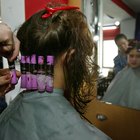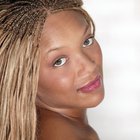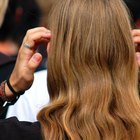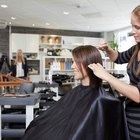Perms often have a notorious reputation. There are plenty of safety concerns regarding perms that you need to understand before your next visit to a salon or purchasing a home kit. The most important areas to consider before getting a perm is the level of dryness it can create on your scalp, the type of hair loss it might cause, what types of harmful chemicals are used and the hassles of maintenance.
Dryness
People with psoriasis or extensive dandruff should avoid perms. One way to avoid certain levels of dry scalp is to line your scalp, before applying the perm solution, with either Vaseline or a thick, nonscented body lotion coated in aloe vera. However, be careful not to grease your scalp line too much or else the chemicals of the perm solution might not take to your hair.
Hair Loss
Perms, often when self-applied or done improperly, can cause hair loss. Often, if hair has breakage and dries out, it can take six months to a year for a full head of healthy hair to grow back. Unfortunately, perms are extremely popular with older clients for their presumed ease of maintenance, but perms are one of the most unhealthy options for hair care at this age because the hair is at its thinnest and driest. In rare cases, particularly with older clients, not all the hair will grow again along the natural scalp line.
Harmful Chemicals
Most chemicals need to set at 212 degrees Farenheit, so chemicals in the perm solution are extremely toxic and can burn the scalp line easily. If you feel burning along your scalp line or if you see pink or red patches of inflamed scalp, immediately rinse.
Maintenance
Maintaining a perm can initially be expensive if you do not already have the necessary hair care products. Be sure to use a pre-conditioner before applying the perm solution and deep conditioner afterward. Do not shower for at least 24-48 hours after rinsing your hair from the initial perm solution to allow your hair time to heal.
Further warnings
Perms can give dull, limp hair a full head of curls. However, not everyone's hair takes to a perm easily. Some hair types and textures might not take to a perm solution, and will cause slight waves or kinky, frizzy hair.
Related Articles

How to Heal Sores in Your Scalp From a ...

Uneven Hair Growth

How to Get a Healthy Spiral Perm

How to Relax a Perm With Home Remedies

Can Hair Dye Cause Severe Itching of ...

Perms & Thinning Hair

How to Decide Which Perm is Best for You

Side Effects of Lye in Hair Relaxers

Can I Wet My Hair After a Perm?

Types of Hair Treatment

Reasons That a Perm Did Not Take

How to Stop Your Hair From Looking Dry ...

How to Get Rid of Frizzy Straight Hair

How to Remove Hairspray From Wigs

How to Perm African American Hair

The Best Kinds of Synthetic, ...

How to Use VO5 Products

How to Wash a Curly Weave

Hair Tips for Super Dry Hair

Perm Recommendations for Fine Hair
References
- "Hair Rules! The Ultimate Hair-Care Guide for Women with Kinky, Curly, or Wavy Hair;" Anthony Dickey; 2003
Writer Bio
Randall Jenson is a documentary filmmaker and ethnographic researcher on marginalized communities in America. He received a Bachelor of Arts in anthropology and women and gender studies from DePaul University.